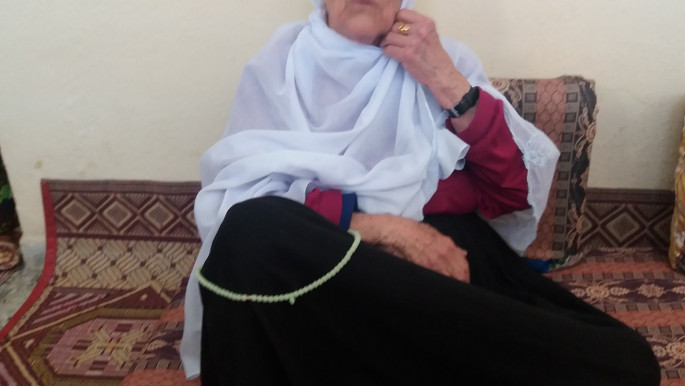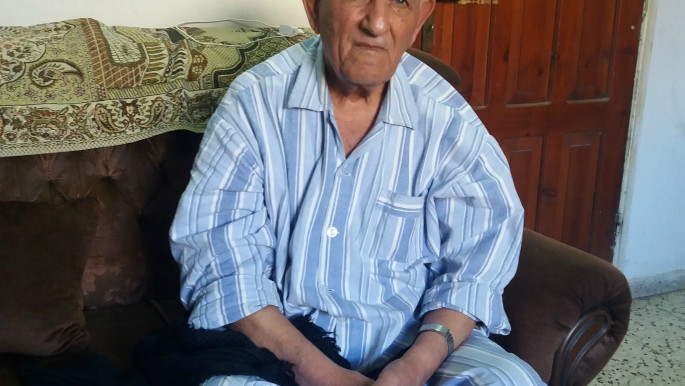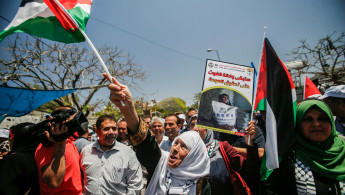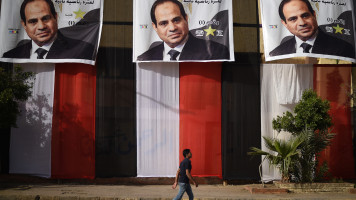Nakba: Seven decades on, Palestinian elders hope to return to their stolen homeland
Both are originally from two different Palestinian villages before the Nakba – or "catastrophe" – which marks the forced displacement of 750,000 Palestinians in 1948 from their homes, towns and villages to make way for Israel's establishment.
In the same year, both Zuhdi and Sadeeqa lost close people, their homes and farmlands and became neighbours in a refugee camp.
Sadeeqa from Breer
Sadeeqa is now a 78-year-old mother of four sons and four girls. She looks healthy and strong and lives alone in a small home of her own in the Alburaij refugee camp.
"You see, I am living in this home and thank God, I am able to take care of myself, away from my own children who live separately. Since Israel expelled us and made us refugees, we have had no choice but to build up our own lives. But, of course it has been such a bitter experience staying away from our homeland."
Early childhood
Sadeeqa told The New Arab that life back in Breer, her home Palestinian village, was a "normal and nice life".
 |
|
| Sadeeqa was only 7 when she was forced to leave her hometown of Breer |
"My mother took care of me with the help of my uncles from her side. I recall how she used to take me to a nearby prayer corner that belonged to Sheikh Se'oud. She would gather with local women from the neighbourhood to pray and chat. I was a little girl but I can still remember," Sadeeqa recalls while sitting next to her 21-year-old grandson, Mohammad.
She also reminisces about how fun and joyful wedding celebrations used to be in her hometown.
"Back then in Breer, many people gathered for a weeding party, where the groom rides a horse among a cheering crowd," she tells The New Arab.
Farming in Breer
According to Sadeeqa, who was only seven-years-old when she and many others were displaced by Israeli force, Breer was known for farming of both fig and grapes.
"I remember that during the harvest season, I was with my uncles at their farmland. When they took me back to my mother, I was carrying some grapes and fig for her."
Forcible separation
When Sadeeqa and her mother had to flee the Breer village, the displacement caused both of them to be separated.
"I remember very well how village dwellers had been set ablaze by by cannons, fired by the invading troops. Because of their firing, we ran towards the nearby Semsem village and then to the Gaza Strip, through the coastline.
 |
But even after 71 years of being displaced from her home village of Breer, Sadeeqa still hopes that one day she will return back |  |
"In Gaza, my uncles from my father's side were separated from my mother due to community habits and customs. So my mother moved to the Nuseirat refugee camp in central Gaza Strip, while my uncles and I lived in Gaza city's Sh'af neighbourhood.
"When I was 18-years-old, I got married and moved to live here in the Alburaij refugee camp," Sadeeqa says.
But even after 71 years of being displaced from her home village of Breer, only 30 kilometres away from Gaza to the east northern side of the coastal Strip, Sadeeqa still hopes that one day she will return back.
"I can never deny the fact that I am so eager to return back to Breer before I pass away, yet I believe that the situation of Palestinians and the Palestinian cause is the worst-ever and there is no any prospect," she says.
"I remember in the 1980s, my husband took me and the children to a picnic around abandoned Palestinian villages inside historical Palestine. When we passed by Breer and I saw the same palm trees which I used to play under, I cried loudly and felt as if my heart was taken from me."
 |
When we passed by Breer and I saw the same palm trees which I used to play under, I cried loudly and felt as if my heart was taken from me |  |
Zuhdi from Robeen
 |
|
| Zuhdi is a father of five sons and four daughters and grandfather to dozens of grandchildren |
Zuhdi, now 83, has lived in the Alburaij refugee camp in central Gaza Strip since the day of the Nakba, when Israel was created on the ruins of displaced Palestinian towns and villages.
He was originally from Robeen, on the outskirts of the Palestinian city of Jaffa. According to Zuhdi, who is a retired school teacher of social sciences, the Robeen village was a rich one in terms of orange and citrus production, due to a suitable climate and the existence of water channels.
"My village was one of the most famous farmlands," he recalls.
"My father himself had a large acre of citrus farmland which he would come and tend to after having finished his daily work as an employee with a British colonial military camp of the time. My father worked as a carpenter for that military camp in Robeen," Zuhdi tells The New Arab at his Alburaij residential home.
Zuhdi, who is a father of five sons and four daughters and grandfather to dozens of grandchildren, looked healthy except from some intermittent coughing.
"My father used to take me to the Jum'a Abu Abdallah coffee shop, where folks of the village used to gather to relax and catch up. I remember how people enjoyed listening to the radio. I used to watch it all with amazement," he says.
"But days before the Nakba, we had no electricity in Palestine."
 |
I remember how people enjoyed listening to the radio. I used to watch it all with amazement |  |
A peaceful normal life
Back in Robeen, Zuhdi was enrolled at the Sarafand primary school.
"I remained in the Sarafand school till the sixth grade. I used to ride a donkey in order to go to my school, which laid the foundation for my profession as a teacher of social sciences. During weekends, my father used to take us to the Alhamra cinema in Jaffa city and to go have dessert. I used to love eating a sugar pie stuffed with butter," Zuhdi recalls.
The Nakba day
During the Nakba day itself, Zuhdi says that no family in the Robeen village had any chance of defending themselves from the attacks by Israelis.
 |
I remember that out of all the men in our village, only five had rifles |  |
"Can you imagine, hours after the British military camp was evacuated, we were attacked by militants. I remember that out of all the men in our village, only five had rifles."
Still hopeful
The 83-year-old Palestinian refugee, like Sadeeqa, still dreams of returning back to his home village, but Zuhdi is not that optimistic it will ever happen due to the current political complications.
"I would say to the new generation of refugees, never drop the dream of returning back," he says.
Rami Almeghari is a Palestinian freelance journalist living and working in Gaza.
Follow him on Twitter: @writeralmeghari



